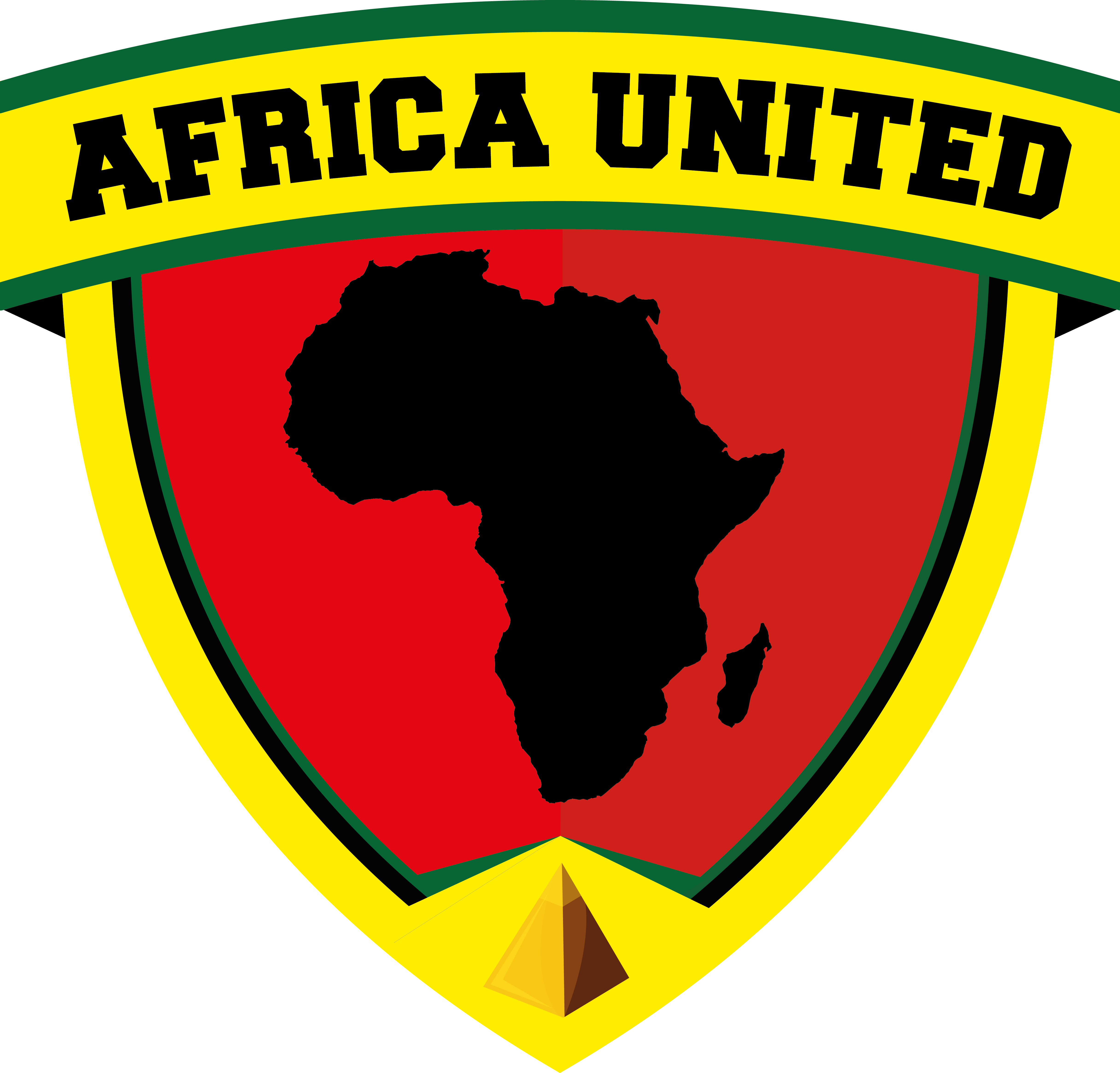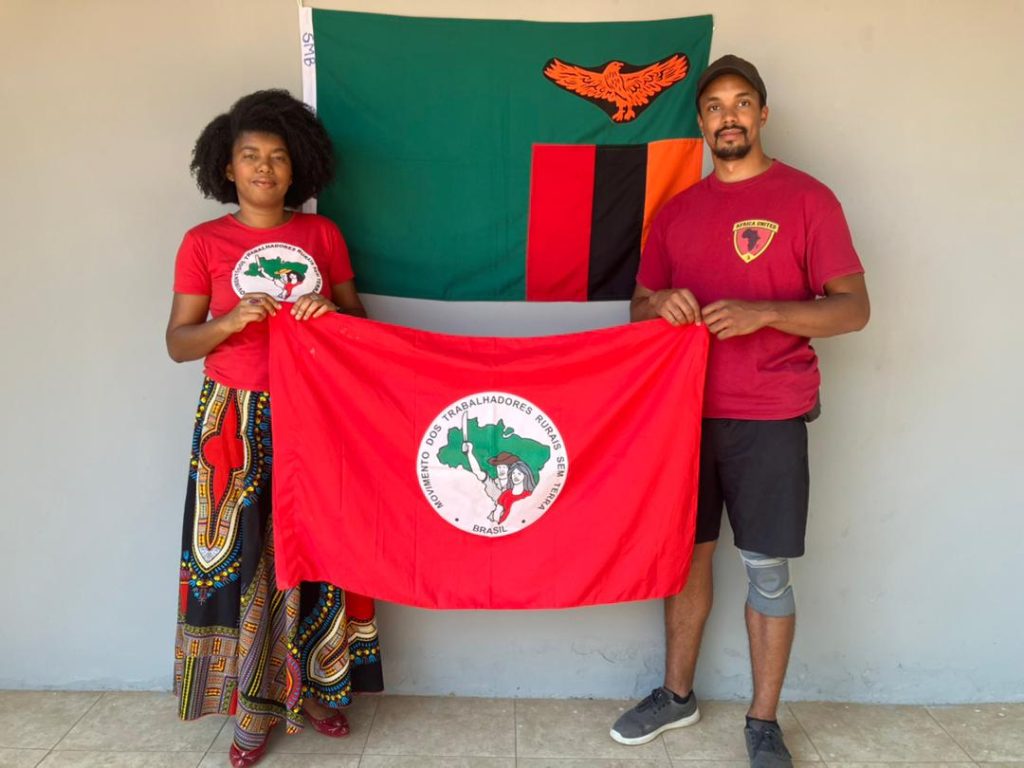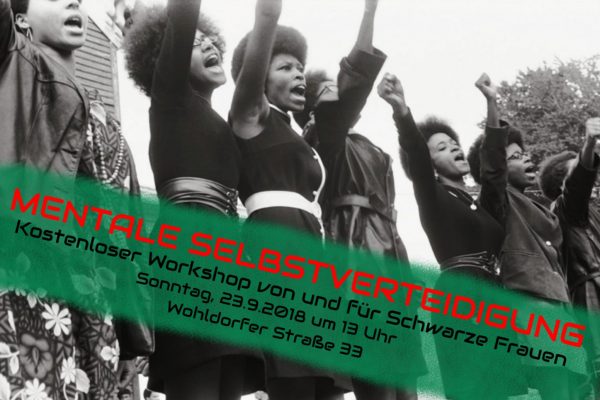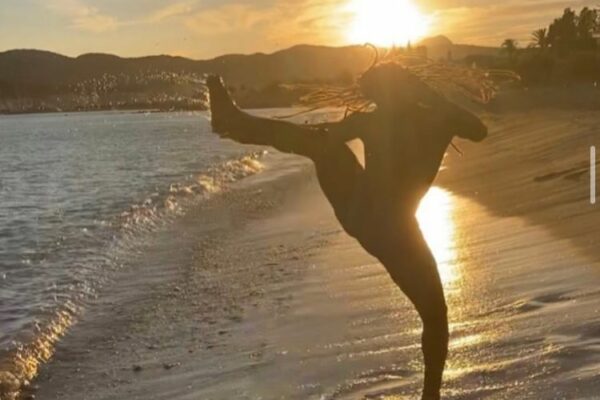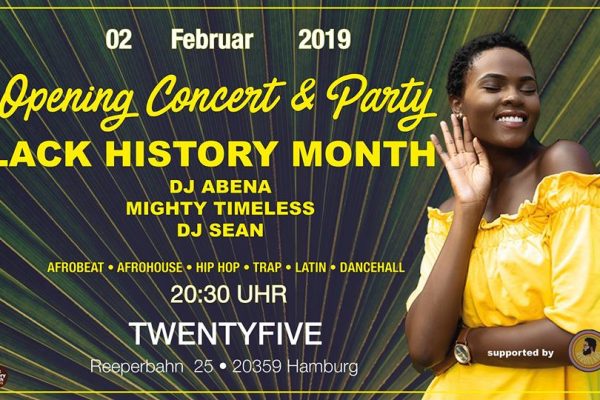In remembrance of Samora Machel: An interview with internationalist activist Paula from Brazil´s Landless Workers Movement (MST) in Lusaka, Zambia
A board member of Africa United is currently in Zambia, where he was able to get to know other committed activists and organizers. In remembrance of revolutionary Samora Machel, leader of the anticolonial liberation war in Mozambique and first president of the country, we publish this interview. Samora Machel was murdered on 19th of October 1986 under the responsibility of the fascist apartheid dictatorship in South Africa. The inspiration Samora Machel gave us through his fight for African liberation, unity and international solidarity remain another proof that „you cannot kill ideas“.
The aim of this interview is to broaden our perspectives and to introduce the inspiring struggles and internationalist practices currently taking place in Africa and the Diaspora. This interview was conducted with Paula of the Landless Workers Movement MST (Movimento dos Trabalhadores Rurais Sem Terra) from Brazil, who currently lives and works in Zambia.
Paula, please introduce yourself: Who are you and what have you been doing in the last years?
My name is Paula França. I have been part of the MST since 2002. Until 2019 I worked in the education sector of the MST, then in that year I was nominated to come to Zambia. Currently, I am one of the coordinators of the Samora Machel Brigade, which since 2017 has been carrying out actions in the areas of education, health, agroecology, communication and women’s work in marginalized areas and disadvantaged rural communities in the country, as well as other targeted actions in countries in Southern Africa.
What is the background and what are some of the goals that the the Samora Machel Internationalist Brigade could reach?
The MST began its actions in Africa in 2008 in Mozambique, together with peasant organizations, and then moved to South Africa, working with the NUMSA union. Our goals on the ground are set by our political partners. In the field of agroecology, we teach people in the villages to produce organic fertilizers, and we try to recover traditional seeds for the production of healthy food. Due to the high illiteracy rate here, we have implemented an agroecology and literacy campaign, in the first phase of which we literated 2000 learners in three provinces (East, Lusaka and West). Other fronts where we are active are health and women, we teach how to make soap to generate an own income for women.
Your brigade is named after the African revolutionary Samora Machel. Exactly 36 years after him passing away, how would you describe nowadays significancy of the historic liberation struggles he was part of and of the ideas he vocalized back then?
Samora Machel was one of the great revolutionary leaders of Africa. The struggle for Mozambique’s independence was hard and left us with many lessons, such as the importance of universalizing education and health, justice and guaranteeing social rights, empowering women, food sovereignty, and much more. Our international solidarity had its starting point here in Mozambique. A few years later, the MST in South Africa made the political decision to form a brigade. In building the collective, we gave ourselves this name for two reasons: first, because of the internationalist experience we had gained in Mozambique with organizations that Samora Machel had helped create, and second, to honor Samora’s own history as a political figure, his achievements, and the importance of his struggle and resistance for the liberation of the Mozambican people from Portuguese colonialism. Our identity was developed collectively, it is in line with the practice of the MST to mark its spaces and collectives with the names of fighters and thinkers important to the struggle of the working-class. Today, we continue to emphasize the need to maintain this memory for all brigadists and for the entire landless people’s movement.
Last month you were holding a public Webinar on the legacy of Brazilian educator and philosopher Paulo Freire, who is broadly known for his book „Pedagogy of the oppressed “. What is his significance to you and what are some of his key lessons to the movement in Brazil and around the world?
Paulo Freire is a representative of popular education, which we can summarize as education of the people, for the people, and by the people themselves. When he wrote Pedagogy of the Oppressed, we could understand how the capitalist system uses education as a means to hold down oppressed people through a „bankers education.“ Additionally, we understand dialogic education as a practice of freedom. These theories form the basis of the MST’s experience in education, culture, communication, health, grassroots work, production, etc. Outside Brazil, there are many positive examples, such as the literacy campaign in Guinea-Bissau, which was part of the liberation process from Portuguese colonization in the 1960s.
How important are popular organizations? What role can mental and physical education play in empowering youth, women, peasants, and working-class people?
Popular organization is one of the keys to the liberation of the people. In a capitalist society like the one we live in, the strength of the working class lies in its ability to organize itself. Physical and mental education, in this sense, are tools that youth, women and the working class in general can use to strengthen themselves. Both from the point of view of the production of socially created knowledge, which too often silences the many intellectuals, scientists and theories from regions such as Africa and Latin America and includes only Eurocentric knowledge, and from the point of view of access to this knowledge. It is crucial to provide for the creation of an emotional, spiritual and intellectual consciousness based on a different aesthetic and history. In this way, doing sports as physical education can include other forms of interaction between human and nature and between different bodies and generations that do not conform to the dominant norms, using games and likewise exercises of fitness and resistance that come from different cultures.
This month the Brazilian general elections are taking place. In what situation are those elections happening? What are some of the main challenges for the country?
This election is being called historic because of the controversy surrounding the two projects putting the future of the country at stake. On the one hand, we have the current president Bolsonaro, who is rated as the worst president in the history of Brazil, linked to the criminal gangs, has several charges of corruption running, refused to buy vaccines and caused the death of almost 700 thousand Brazilians in the Covid19 pandemic. With his neo-Nazi orientation, he has facilitated an easy access to firearms and imposed very racist, sexist, homophobic and xenophobic policies. The other option, which we and 53.2 million Brazilians voted for in the first round with 53% of the valid votes, is Lula of the PT (Workers‘ Party), who was president for two terms and had real chances to win the last elections, but was arrested on corruption charges and found innocent after a long trial. Despite the positive evaluation of his government in the country’s history, with measures to eradicate poverty, opening universities in remote areas, supporting land rights and promoting family farming, among other important programs, there is still a risk that Bolsonaro will win these elections instead. This is because he is supported in the National Congress by the large landowners who achieve their profits through the deforestation of the Amazon and the enormous use of agricultural poisons, as well as by the evangelicals who use their churches in the poorest regions to convince believers to vote for Bolsonaro with Fake News. Unfortunately, the scenario is worrisome, and although it is clear that the people should choose a candidate who will implement policies to strengthen the working-class, the PT is being worn down by allegations of corruption, Fake News, and distancing itself from grassroots work in the peripheries and rural areas. Although more than 33 million people have gone hungry again under Bolsonaro’s government, he still has a chance to remain president.
Brazil is, just after Nigeria, the state with the most numerous Black populations around the world. What is the situation for Afro descendants in the country and how important is internationalism to overcome the challenges our people are facing?
The situation of Black people in Brazil is very complex. We are a relatively young nation at 522 years, but of those 350 years we have lived under the regime of slavery and the repeated attempts to eradicate traditional/indigenous peoples. Brazil is the country where most enslaved Africans arrived and the last country in the world to abolish slavery. With this process also immediately began the persecution, imprisonment and murder of Black people, because the country had a project to whiten the population. Even today, Black people feel the wounds of this historical process, as they attend prisons the most and universities the least; the wages of Black people are on average 30% lower than those of white people; in recent years, the feminicides against white women has decreased, while that against Black women has increased by more than 15%. Another aggravating factor is the genocide of young Black people. Every day in Brazil, 63 young people (mostly men up to 29 years old) are murdered, which is about 23,000 per year, a number greater than the casualties of many wars, but because of the structural racism under which our country was born, these deaths are naturalized and the other forms of racism that are practiced every day are also kept silent. Today we say that the only way to reverse this scenario is to break with the current social model. There are no easy solutions, and even specific policies cannot solve the immediate problems if the racist root is still a fundamental pillar that structures Brazilian society. As mentioned before, we are the largest African diaspora, and therefore we believe that Pan-Africanism can be part of the process of liberation of the Black people, as well as the appreciation of our African origins, along with a process of historical reparations that guarantees access to dignified living conditions through culture, education, work and income.
Is it possible to follow the work that you are doing somewhere online? How can Black people in the Germany or other countries in general practice solidarity?
The MST turned 38 years old this year, and thanks to its internationalist actions, which have been a principle from the beginning, it has committees of friends in countries on every continent. These organizations know the work we are doing in the struggle for land, for land reform and for the transformation of society, and are convinced of it. Black and non-Black people can practice solidarity through the MST Friendship Committees, publicize our campaigns, donate, use our experiences, and visit the Escola Nacional Florestan Fernandes, a political education institution that welcomes workers‘ organizations from all parts of the world for courses, visits, seminars, and cultural activities. There are some websites that can help you learn more about our work:
- Grassrootsonline
- MST Website
- MST Instagram
- MST Facebook
- MST: Florestan Fernandes National School
- MST: Paulo Freire
Is there anything else that you would like to add?
The MST is an organization that seeks social justice and places people at the center of its processes. In this spirit, in September 2017, the landless Black people created the study group „Land, Race and Class“ to deepen the understanding of issues related to the race and agrarian question and to promote the connection with the organizations of the Black Movement.
Thank you, for taking time to answer our questions and for doing this great and inspiring work!
Thank you for the opportunity to share a little about our work and experiences. It is important to emphasize that many of the ideas presented here come from the collective reflections of the MST; in this sense, I thank you for the space, also on behalf of the Samora Machel Brigade.
We meet in struggle!
Paula França
+++ DEU +++
In Gedenken an Samora Machel: Ein Interview mit der Internationalistin Paula von der brasilianischen „Bewegung der Landlosen“ (MST) in Lusaka, Sambia
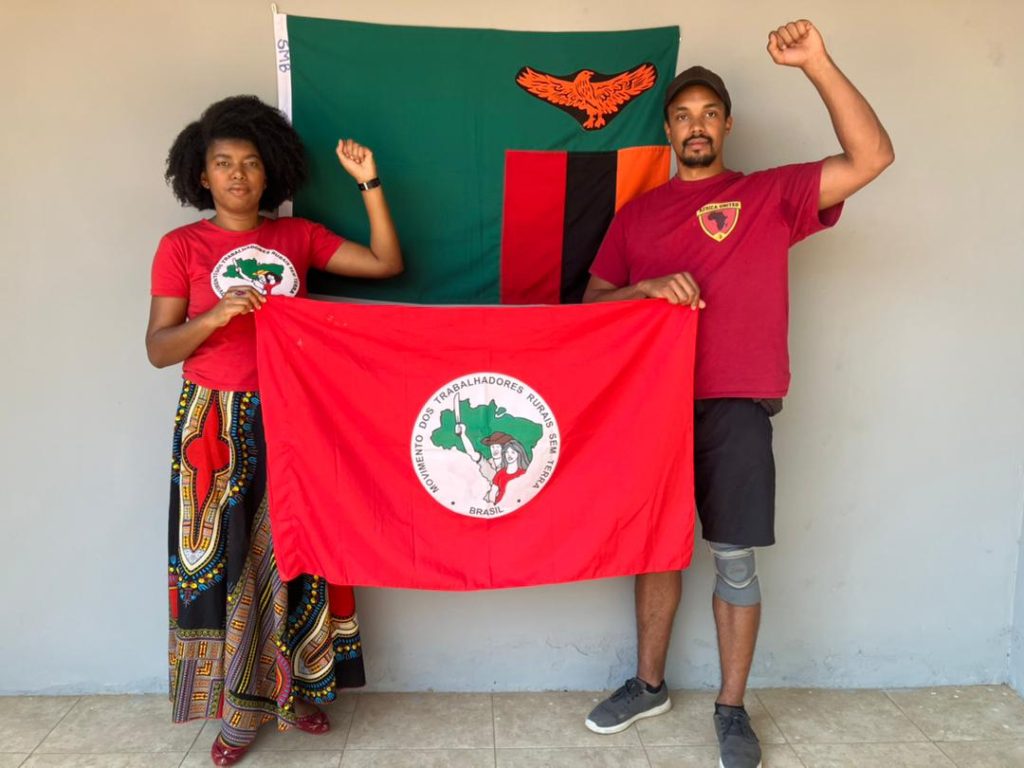
Ein Vorstandsmitglied von Africa United ist derzeit in Sambia, wo er andere engagierte Aktive und Organizer kennenlernen konnte. Im Gedenken an den Revolutionär Samora Machel, Anführer des antikolonialen Befreiungskrieges in Mosambik und erster Präsident des Landes, veröffentlichen wir dieses Interview. Samora Machel wurde am 19. Oktober 1986 ermordet, verantwortlich dafür ist die faschistische Apartheid-Diktatur Südafrikas. Die Inspiration, die Samora Machel uns durch seinen Kampf für die Befreiung Afrikas, für Einheit und internationale Solidarität gegeben hat, liefert einen weiteren Beweis dafür, dass sie „Ideen nicht töten können“.
Ziel dieses Interviews ist es, unseren Blickwinkel zu erweitern und die inspirierenden Kämpfe und internationalistischen Praktiken vorzustellen, die derzeit in Afrika und in der Diaspora stattfinden. Dieses Interview wurde mit Paula von der Landlosenbewegung MST (Movimento dos Trabalhadores Rurais Sem Terra) aus Brasilien geführt, die derzeit in Sambia lebt und arbeitet.
Paula, bitte stell dich einmal vor: Wer bist Du woran hast Du in den letzten Jahren so gearbeitet?
Mein Name ist Paula França. Ich gehöre seit 2002 zur MST. Bis 2019 habe ich im Bildungsbereich des MST gearbeitet, in dem Jahr wurde ich dann nominiert, nach Sambia zu kommen. Derzeit bin ich eine der Koordinatorinnen der Samora-Machel-Brigade, die seit 2017 Aktionen in den Bereichen Bildung, Gesundheit, Agrarökologie, Kommunikation und Frauenarbeit in Randgebieten und benachteiligten ländlichen Gemeinden des Landes, sowie weitere gezielte Aktionen in Ländern des südlichen Afrika durchführt.
Was ist der Hintergrund der Brigade und welche Erfolge konnte die Samora Machel Internationalist Brigade erreichen?
Die MST begann ihre Aktionen in Afrika 2008 in Mosambik zusammen mit bäuerlichen Organisationen, danach ging sie nach Südafrika, wo mit der Gewerkschaft NUMSA zusammenarbeitet wurde. Unsere Ziele vor Ort werden von unseren politischen Partnern festgelegt. Im Bereich der Agrarökologie lehren wir die Menschen in den Dörfern, organische Düngemittel herzustellen, und wir versuchen, traditionelles Saatgut für die Erzeugung gesunder Lebensmittel zurückzugewinnen. Aufgrund der hohen Analphabetenrate hier haben wir eine Agrarökologie- und Alphabetisierungskampagne durchgeführt, in deren erster Phase wir 2000 Lernende in drei Provinzen (Ost, Lusaka und West) alphabetisiert haben. Weitere Fronten an der wir aktiv sind, sind Gesundheit und Frauen, wir unterrichten darin, Seife herzustellen, um ein eigenes Einkommen für Frauen zu erzielen.
Ihre Brigade ist nach dem afrikanischen Revolutionär Samora Machel benannt. Wie würdest Du heute, genau 36 Jahre nach seinem Tod, die Bedeutung der historischen Befreiungskämpfe, an denen er beteiligt war, und der Ideen, die er vertrat, beschreiben?
Samora Machel war einer der großen Revolutionsanführer Afrikas. Der Kampf um die Unabhängigkeit Mosambiks war hart und hat uns viele Lehren hinterlassen, wie z.B. die Bedeutung der allgemeinen Verbreitung von Bildung und Gesundheit, Gerechtigkeit und die Gewährleistung sozialer Rechte, die Stärkung der Frauen, Ernährungssouveränität und vieles mehr. Unsere internationale Solidarität hatte hier in Mosambik ihren Ausgang. Einige Jahre später traf die MST in Südafrika die politische Entscheidung, eine Brigade zu bilden. Beim Aufbau des Kollektivs gaben wir uns diesen Namen aus zwei Gründen: zum einen aufgrund der internationalistischen Erfahrungen, die wir in Mosambik mit Organisationen gesammelt hatten, die von Samora Machel mit ins Leben gerufen worden waren, und zum anderen um Samoras eigene Geschichte als politische Figur, seine Leistungen und die Bedeutung seines Kampfes und Widerstands für die Befreiung des mosambikanischen Volkes vom portugiesischen Kolonialismus zu würdigen. Unsere Identität wurde kollektiv entwickelt, es entspricht der Praxis der MST, ihre Räume und Kollektive mit den Namen von Kämpfer*innen und Denker*innen zu kennzeichnen, die für den Kampf der Arbeiter*innenklasse wichtig sind. Auch heute noch betonen wir die Notwendigkeit, diese Erinnerung für alle Brigadisten und für die gesamte Landlosenbewegung zu pflegen.
Letzten Monat hast Du ein öffentliches Webinar über das Vermächtnis des brasilianischen Pädagogen und Philosophen Paulo Freire abgehalten. Er ist vor allem für sein Buch „Pädagogik der Unterdrückten“ bekannt. Was ist seine Bedeutung für Euch und was sind einige seiner wichtigsten Lehren für die Bewegung in Brasilien und auf der ganzen Welt?
Paulo Freire ist ein Vertreter der Volksbildung, die wir als Bildung des Volkes, für das Volk und durch das Volk selbst zusammenfassen können. Als er die Pädagogik der Unterdrückten schrieb, konnten wir verstehen, wie das kapitalistische System die Bildung als Mittel einsetzt, um unterdrückte Menschen durch eine „Kassenbildung“ niederzuhalten. Außerdem verstehen wir dialogische Bildung als eine Praxis der Freiheit. Diese Theorien bilden die Grundlage für die Erfahrungen der MST in den Bereichen Bildung, Kultur, Kommunikation, Gesundheit, Basisarbeit, Produktion usw. Außerhalb Brasiliens gibt es zahlreiche positive Beispiele, wie etwa die Alphabetisierungskampagne in Guinea-Bissau, die Teil des Befreiungsprozesses von der portugiesischen Kolonialisierung in den 1960er Jahren war.
Wie wichtig sind breite, populäre Organisationen? Welche Rolle kann geistige und körperliche Bildung bei der Stärkung der Jugend, der Frauen, der Bauern und der Arbeiterklasse spielen?
Die populäre Organisation ist einer der Schlüssel zur Befreiung des Volkes. In einer kapitalistischen Gesellschaft wie der, in der wir leben, liegt die Stärke der Arbeiter*innenklasse in ihrer Fähigkeit, sich zu organisieren. Körperliche und geistige Bildung sind in diesem Sinne Werkzeuge, welche Jugendliche, Frauen und die Arbeiter*innenklasse im Allgemeinen nutzen können, um sich selbst zu stärken. Sowohl unter dem Gesichtspunkt der Produktion von sozial geschaffenem Wissen, das zu oft die vielen Intellektuellen, Wissenschaftler*innen und Theorien aus Regionen wie Afrika und Lateinamerika verschweigt und nur eurozentrisches Wissen beinhaltet, als auch unter dem Gesichtspunkt des Zugangs zu diesem Wissen. Es ist entscheidend für die Schaffung einer emotionalen, geistigen und intellektuellen Intelligenz zu sorgen, die auf einer anderen Ästhetik und Geschichte basiert. So kann der Sport andere Formen der Interaktion zwischen Mensch und Natur sowie zwischen verschiedenen Körpern und Generationen ermöglichen, die nicht den gängigen Normen entsprechen, und Spiele und ebenso Kraft- und Widerstandsübungen nutzen, die aus verschiedenen Kulturen stammen.
In diesem Monat finden die allgemeinen Wahlen in Brasilien statt. In was für einer Situation finden diese Wahlen statt? Was sind einige der größten Herausforderungen für das Land?
Diese Wahl wird als historisch bezeichnet, da die verschiedenen Projekte, die für das Land im Raum stehen, sehr umstritten sind. Auf der einen Seite haben wir den derzeitigen Präsidenten Bolsonaro, der als der schlechteste Präsident in der Geschichte Brasiliens bewertet wird, der mit den kriminellen Banden verbandelt ist, mehrere Anklagen wegen Korruption laufen hat, den Kauf von Impfstoffen zu verweigerte und den Tod von fast 700 Tausend Brasilianer*innen in der Covid19-Pandemie verursacht hat. Mit seiner neonazistischen Ausrichtung hat er den Zugang zu Schusswaffen erleichtert und eine sehr rassistische, sexistische, homophobe und fremdenfeindliche Politik durchgesetzt. Die andere Option, die wir und 53,2 Millionen Brasilianer in der ersten Runde mit 53 % der gültigen Stimmen gewählt haben, ist Lula von der PT (Arbeiterpartei), der für zwei Amtszeiten Präsident war und echte Chancen hatte, die letzten Wahlen zu gewinnen, aber wegen Korruptionsvorwürfen verhaftet und nach einem langen Prozess für unschuldig befunden wurde. Trotz der positiven Bewertung seiner Regierung in der Geschichte des Landes, mit Maßnahmen zur Beseitigung der Armut, Eröffnung von Universitäten in abgelegenen Gebieten, die Landrechte und die Förderung der landwirtschaftlichen Familienbetriebe unterstützt hat, neben anderen wichtigen Programmen, besteht nach wie vor die Gefahr, dass stattdessen Bolsonaro diese Wahlen gewinnt. Denn er wird im Nationalkongress von den Großgrundbesitzern unterstützt, die ihre Profite mit der Abholzung des Amazonas und dem enormen Einsatz von Agrargiften erreichen, sowie auch von den Evangelikalen, die ihre Kirchen in den ärmsten Regionen einsetzen, um Gläubige mit Fake News davon zu überzeugen, für Bolsonaro zu stimmen. Leider ist das Szenario besorgniserregend, und obwohl klar ist, dass die Bevölkerung sich für einen Kandidaten entscheiden sollte, der eine Politik zur Stärkung der Arbeiter*innenklasse umsetzt, wird die PT durch Korruptionsvorwürfe, Fake News und die Entfernung von der Basisarbeit in den Peripherien und ländlichen Gebieten zermürbt. Obwohl unter Bolsonaros Regierung wieder mehr als 33 Millionen Menschen hungern mussten, hat er immer noch die Chance, Präsident zu bleiben.
Brasilien ist nach Nigeria der Staat mit der zahlenmäßig größten Schwarzen Bevölkerung der Welt. Wie ist die Situation der Menschen Afrikanischer Herkunft im Land und wie wichtig ist Internationalismus, um die Herausforderungen zu bewältigen, mit denen unsere Leute konfrontiert ist?
Die Situation des Schwarzen Volkes in Brasilien ist sehr komplex. Wir sind mit 522 Jahren eine relativ junge Nation, aber von diesen 350 Jahren haben wir unter dem Regime der Sklaverei und den wiederholten Versuchen gelebt, traditionelle/indigene Völker auszurotten. Brasilien ist das Land, in dem die meisten versklavten Afrikaner*innen ankamen und das letzte Land der Welt, das die Sklaverei abgeschafft hat. Mit diesem Prozess begann auch sofort die Verfolgung, Inhaftierung und Ermordung von Schwarzen Menschen, denn das Land hatte ein Projekt zur weißmachung der Bevölkerung. Auch heute noch spüren Schwarze die Wunden dieses historischen Prozesses, da sie die Gefängnisse am meisten und die Universitäten am wenigsten besuchen; die Löhne von Schwarzen sind im Durchschnitt 30 % niedriger als die von weißen; in den letzten Jahren ist der Feminizid an weißen Frauen zurückgegangen, während die an schwarzen Frauen um mehr als 15 % gestiegen ist. Ein weiterer erschwerender Faktor ist der Völkermord an jungen Schwarzen Menschen. Jeden Tag werden in Brasilien 63 junge Menschen (meist Männer bis 29 Jahre) ermordet, das sind etwa 23.000 pro Jahr, eine Zahl, die größer ist als die Opferzahlen vieler Kriege, doch aufgrund des strukturellen Rassismus, unter dem unser Land entstanden ist, werden diese Todesfälle naturalisiert und auch die anderen Formen des Rassismus, die tagtäglich praktiziert werden, verschwiegen. Heute sagen wir, dass wir dieses Szenario nur umkehren können, wenn wir mit dem derzeitigen Gesellschaftsmodell brechen. Es gibt keine einfachen Lösungen, und auch spezifische politische Maßnahmen können die unmittelbaren Probleme nicht lösen, wenn die rassistische Wurzel ist nach wie vor ein Grundpfeiler ist, der die brasilianische Gesellschaft strukturiert. Wie bereits erwähnt, sind wir die größte afrikanische Diaspora, und deshalb glauben wir, dass der Panafrikanismus Teil des Prozesses der Befreiung der Schwarzen Volkes sein kann, ebenso wie die Würdigung unserer afrikanischen Herkunft, zusammen mit einem Prozess der historischen Reparationen, der den Zugang zu würdigen Lebensbedingungen durch Kultur, Bildung, Arbeit und Einkommen garantiert.
Wie können Schwarze Menschen in Deutschland oder in anderen Ländern im Allgemeinen Solidarität üben?
Die MST ist in diesem Jahr 38 Jahre alt geworden, und dank ihrer internationalistischen Aktionen, die von Anfang an ein Grundsatz waren, hat sie Komitees von Freund*innen in Ländern auf allen Kontinenten. Diese Organisationen kennen die Arbeit, die wir im Kampf um Land, für die Landreform und für die Umgestaltung der Gesellschaft leisten, und sind überzeugt von ihrer Richtigkeit. Schwarze und Nicht-Schwarze können über die Freundschaftskomittees der MST Solidarität üben, unsere Kampagnen bekannter machen, spenden, unsere Erfahrungen nutzen und die Escola Nacional Florestan Fernandes besuchen, eine Einrichtung für politische Bildung, die Arbeiter*innen- Organisationen aus allen Teilen der Welt zu Kursen, Besuchen, Seminaren und kulturellen Aktivitäten empfängt. Es gibt einige Websites, die dabei helfen können, mehr über unsere Arbeit zu erfahren.
Gibt es noch etwas, das Du hinzufügen möchtest?
Die MST ist eine Organisation, die soziale Gerechtigkeit anstrebt und den Menschen in den Mittelpunkt ihrer Prozesse stellt. In diesem Sinne haben die landlosen Schwarzen Menschen im September 2017 die Studiengruppe „Land, Rasse und Klasse“ gegründet, um Themen zu vertiefen, die die Rassen- und Agrarfrage betreffen und um die Verbindung zu den Organisationen der Schwarzen Bewegung zu fördern.
Vielen Dank, dass Du dir die Zeit genommen hast, unsere Fragen zu beantworten und dass ihr diese großartige und inspirierende Arbeit leistet!
Ich danke Euch für die Gelegenheit, ein wenig über unsere Arbeit und Erfahrungen zu berichten. Es ist wichtig zu betonen, dass viele der hier vorgestellten Ideen aus den kollektiven Überlegungen der MST stammen; in diesem Sinne danke ich Euch für den Raum, auch im Namen der Samora-Machel-Brigade.
Wir treffen uns im Kampf!
Paula França
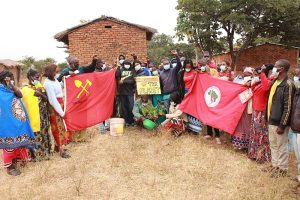
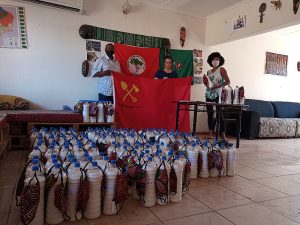
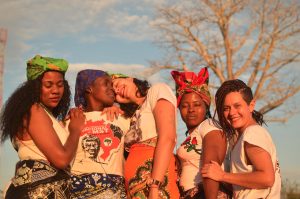
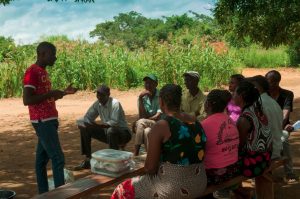
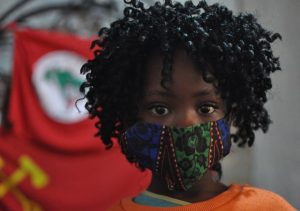
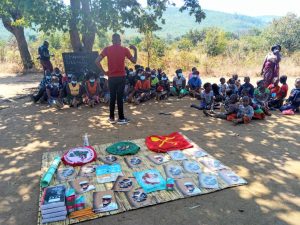
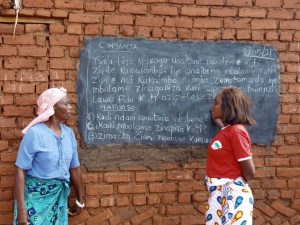
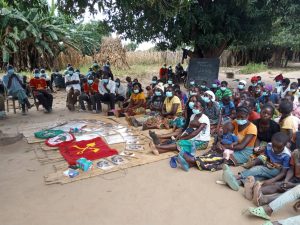
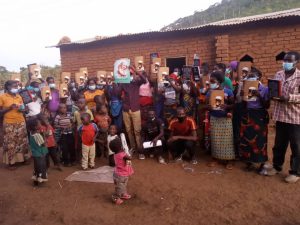
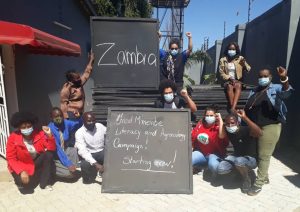
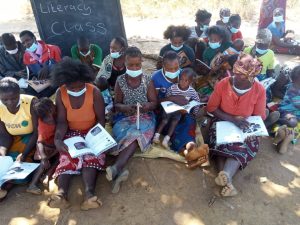
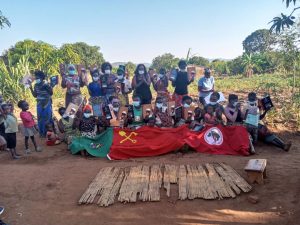
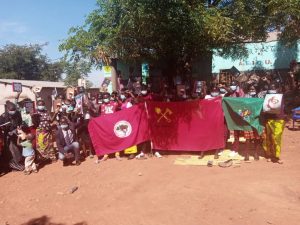
photo credits: Fabio Andrey Pimentel / MST website
Links:
- Grassrootsonline
- MST Website
- MST Instagram
- MST Facebook
- MST: Florestan Fernandes National School
- MST: Paulo Freire
- Pan Africanism Today (FB)
- „In Zâmbia, Literacy and Agroecology Campaign trains 2,000 people“ – MST Website
Original Interview (English questions / Portuguese answers):
Entrevista original (perguntas em inglês, respostas em português)
Paula, please introduce yourself: Who are you and what have you been doing in the last years?
Meu nome é Paula França faço parte do MST desde 2002, atuei no setor de educação do MST até 2019, quando fui indicada a vir para a Zâmbia. Atualmente sou uma das coordenadoras da Brigada Samora Machel que desenvolve ações em educação, saúde, agroecologia, comunicação e trabalho com mulheres, desde 2017 na periferia e comunidades rurais carentes do país e ações pontuais em países da Africa Austral.
What is the background and what are some of the goals that the Samora Machel Internationalist Brigade could reach?
O MST iniciou as ações na África em 2008 em Moçambique junto com a organizações camponesas, depois disso mudou-se para a África do Sul onde atuou com o NUMSA. Nossos objetivos são definidos por nossos parceiros políticos. Assim, na área de agroecologia, estamos fazendo coisas práticas para ensinar as pessoas das vilas rurais a aprender como fazer fertilizantes orgânicos, também estamos tentando recuperar as sementes tradicionais para produzir alimentos saudáveis. Devido às altas taxas de analfabetismo, implementamos a campanha de alfabetização e agroecologia, cuja primeira fase nós alfabetizamos 2000 educandos em 3 províncias (Eastern, Lusaka and Western). Outra frente é a de saúde e mulheres, estamos ensinando elas como fazer sabão para a busca de geração de renda.
Your brigade is named after the African revolutionary Samora Machel. Exactly 36 years after him passing away, how would you describe nowadays significancy of the historic liberation struggles he was part of and of the ideas he vocalized back then?
Samora Machel foi um dos grandes líderes revolucionários em África e a luta pela independância de Moçambique foi árdua e nos deixou muitas lições, como a universalização da educação e da saúde, justiça e garantia dos direitos sociais , empoderamento das mulheres, soberania alimentar, entre outras. Apesar de nossa solidariedade internacional iniciar em Moçambique, o MST tem a decisão política de constituir uma brigada anos depois, quando já estava na Áfica do Sul. Ao consolidar o coletivo a definição dessa identidade se deu por dois motivos: pelas ações internacionalistas terem inicado em Moçambique junto as mesmas organizações que Samora Machel ajudou a criar e reforçou o engajamento político e também, pela própria historicidade de Samora enquanto figura política, suas realizações e o signifcado de sua luta e resitência para a libertação do povo moçambicano contra o colonialismo portugues. Houve um processo de cosntrução dessa identidade que foi amadurecido coletivamente, como é pratica do MST de identificar seus espaços e coletivos com o nome de lutadores e pensadores importantes para a luta da classe trabalhadora. Ainda hoje ressaltamos a necessidade de cultivo dessa memória, por todas as brigadistas e para o conjunto do Movimento Sem Terra.
Last month you were holding a public Webinar on the legacy of Brazilian educator and philosopher Paulo Freire, who is broadly known for his book „Pedagogy of the oppressed“. What is his significance to you and what are some of his key lessons to the movement in Brazil and around the world?
Paulo Freire é um dos expoentes da Educação Popular a qual podemos resumir como uma educação do povo, para o povo e pelo povo. Quando ele escreveu a Pedagogia do oprimido conseguimos entender como o sistema capitalista utiliza a educação como um instrumentopara mante o povo oprimido através de uma „educação bancaria“. Também entendemos a importância de uma educação dialógica enquanto prática da liberdade. Estas teorias estão nos fundamentos das experiências do MST tanto na educação como na cultura, comunicação, saúde, trabalho de base, produção, etc. Fora do Brasil há inúmeros exemplos de estudos, e podemos citar a realização da campanha de alfabetização em Guiné Bissau que fez parte do processo de libertação contra a colonização portuguesa na décade de 60. 5. How important are people´s organizations? What role can mental and physical education play in empowering youth, women, peasents and working class people? A organização popular é uma das chaves de libertação do povo. Numa sociedade capitalista como a que vivemos, a força da classe trabalhadora reside na sua capacidade de organização. A educação física e mental, nesse sentido são ferramentas que a juventude, as mulheres e a classe trabalhadora de forma geral podem utilizar para se fortalecerem. Tanto do ponto de vista do acesso ao conhecimento socialmente construído, que muitas vezes escondem uma série de intectuais, cientistas e teorias de locais como África e América latina, evidenciando apenas um conhecimento eurocentrado, então ter acesso a esses conhecimentos são estruturantes para consolidação de uma inteligênica emocional, espiritual e intelectual com base numa outra estética e história. Da mesma forma a educação física pode respeitar outras formas de interação entre o ser humano e a natureza, e também a partir de diferentes corpos e gerações que podem estar fora de padrões estabelecidos, e que trabalhe com jogos, brincadeiras e até mesmo exercicios de força e resitência que tenha origem em diferentes culturas.
This month the Brazilian general elections are taking place. In what situation are those elections happening? What are some of the main challenges for the country?
Esta eleição está sendo caracterizada como uma eleição histórica devido ao nível de disputa entre os projetos que estão sendo colocados para o país. De um lado temos o atual presidente Bolsonaro que é avaliado como o pior presidente da hisória do Brasil, o qual tem envolvimento com a milica, diversas acusações de corrupção, por ser negacionista atrasou a compra de vacinas o que causou a morte de quase 700 mil brasileiros na pandemia do covid 19, além de ter uma orientação neo nazista que facilitou o acesso a armas de fogo e um posicionamento altamente racista, machista, homofóbico e xenofóbico. Do outro nossa opção e de 53,2 milhões de brasileiros que votaram no primeiro turno (53% do votos válidos), é Lula do PT – partido dos trabalhadores, que já foi presidente por 2 mandatos, tinha chances reais de vencer as ultimas eleições quando foi preso por acusação de corrupção e após longo processo foi julgado inocente. Apesar de ter a melhor avaliação da história do país, por ter criado políticas para erradicação da pobreza, aberto universidades em áreas remotas, incentivado a politica de assentamentos e o avanço da agricultura familiar, entre outros importantes programas, ainda existe um risco de não ganhar essas eleições devido a alto apoio do congresso nacional a Bolsonaro por parte da bancada ruralista que aumenta seu lucro com o desmatamento da Amazonia e o enorme uso de agrotóxicos, como também a bancada evangélica que usa suas igrejas nas regiões mais empobrecidas para convencer seus fieis a votarem em Bolsonaro com base em fake news. Infelizmente o cenário é de apreensão e embora pareça óbvio o voto da população a um candidato que implemente polítcas de fortalecimento da classe trabalhadora, há um desgaste a figura do PT, devido as acusações de corrupção, noticias falsas e afastamento do trabalho de base nas periferias e meio rural. Ainda que mais de 33 milhões de pessoas voltaram a passar fome durante o governo Bolsonaro , ele ainda tem chances de se manter na presidencia.
Brazil is, just after Nigeria, the state with the most numerous Black population around the world. What is the situation for Afrodescendants in the country and how important is internationalism to overcome the challenges our people are facing?
A situação do povo negro no Brasil é muito complexa. Somos uma nação relativamente jovem com 522 anos, porém desses 350 anos foram vividos sob o regime da escravidão e sucessivas tentativas de exterminio dos povos tradicionais/ indígenas. É o país que mais recebeu mão de obra de africanos escravizados e o ultimo país do mundo a abolir o escravismo. Assim que esse processo ocorreu inicou também a perseguição, encarceramento e mortes de pessoas negras, pois o país tinha um projeto de embranquecimento da população. Com todo esse histórico nossa situação não poderia ser diferente, até hoje sentimos o povo negro sente as mazelas desse processo histórico, sendo o maior numero nas prisões e o menor número nas universidades, o salário de pessoas negras são em média 30% mais baixos do que de pessoas brancas, nos ultimos anos o feminicídio de mulheres brancas foi reduzido, enquanto de mulheres negras aumentou mais de 15%. Outro agravante é o genocído de jovens negros, todos os dias 63 jovens (em sua maioria homens de até 29 anos) são assaninados no Brasil, cerca de 23 mil por ano, número maior de que muitas guerras, entretanto devido ao racismo estrutural sob o qual nosso país foi forjado, há uma naturalização dessas mortes, assim como invisibilização de outras formas de racismos que são praticados cotidianamente. Hoje dizemos que para reverter esse cenário somente a partir de uma ruptura com o modelo social vigente. Saídas faceis não existem, assim como politicas pontuais podem sanar questões imediatas, porém a raíz racista continua como um pilar que estrutura a sociedade brasileira. Como citado, somos a maior Diáspora africana e por isso acreditamos que o Pan africanismo possa fazer parte desse processo de libertação do povo preto, assim como a apropriação de nossa origem africana, somado a um processo de reparação histórica que garanta o acesso a condições de vida digna por meio de cultura, educação, trabalho e renda.
Is it possible to follow the work that you are doing somewhere online? How can Black people in the Germany or other countries in general practice solidarity?
O MST completou esse anso 38 anos e devido as suas ações internacionalistas, que é um principio desde sua origem, tem comitês de amigos em países em todos os continentes. Essas organizações conhecem e acreditam no trabalho que realizamos na luta pela terra, pela reforma agrária e pela transformação da sociedade. Pessoas negras e não negras podem praticar solidariedade por meio dos comitês de amigos do MST, divulgando nossas campanhas, realizando doações e mesmo visitando nossas experiências e a Escola Nacional Florestan Fernandes, espaço de formação política que recebe organizações de trabalhaores de todas as partes do munda, para cursos, visitas, seminários e atividades culturais. Abaixo alguns endereços eletronicos que podem ajudar nesse processo e para conhecer melhor nosso trabalho.
- https://grassrootsonline.org/who-we-are/partner/landless-workers-movement-mst/
- https://mst.org.br/brigadas-internacionalistas/
- https://pt.wikipedia.org/wiki/Movimento_dos_Trabalhadores_Rurais_Sem_Terra
- https://www.mstbrazil.org/content/what-mst https://www.instagram.com/movimentosemterra/
- hl=en https://mst.org.br/2021/05/05/o-mst-e-o-legado-de-paulo-freire-na-africa/
- https://m.facebook.com/MovimentoSemTerra/ https://www.mstbrazil.org/content/florestan-fernandes-national-school
Is there anything else that you would like to add?
O MST é uma organização que busca a justiça social e coloca o ser humano no centro dos processos, nesse sentido em setembro de 2017 os pretos e pretas sem terra criam o Grupo de Estudos Terra, Raça e Classe, a partir da necessidade de aprofundamento de temas que envolvem a questão racial e a questão agrária, como também de avançar na articulação junto as organizações do movimentos negro.
Thank you, for taking time to answer the of questions and for doing this great and inspiring work!
Agradeço a oportunidade de apresentar um pouco sobre nossas elaborações e experiências. Importante ressaltar que muitas das ideias socializadas aqui vem de reflexões coletivas do MST, nesse sentido agradeço o espaço também em nome da Brigada Samora Machel.
A gente se encontra na luta!
Paula França
